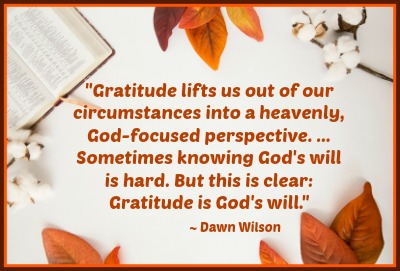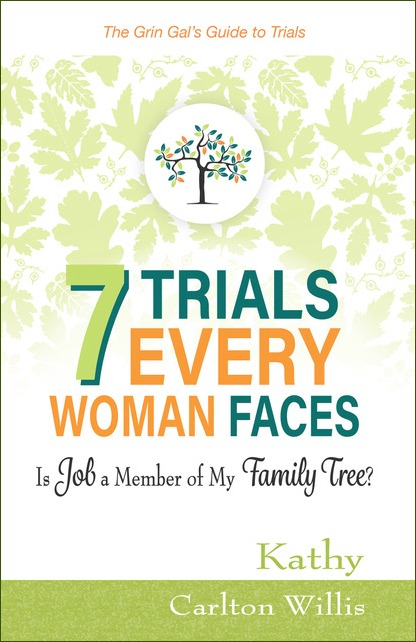Nurturing Gratitude
Sally Ferguson has a tender heart, but she's no wimp; she is strong in the Lord! In this Thanksgiving and Spiritual Growth UPGRADE, she reminds us we can always choose our attitudes, and when the going gets tough, nurturing gratitude is a healthy, godly choice. "Testing pushes our limits, our boundaries and our comfort zones," Sally says.
"Testing pushes our limits, our boundaries and our comfort zones," Sally says.
And I (Dawn) don't like that kind of testing! But I know God has worked through difficulties in my own life, and as He worked in my heart, I found I could say "Thank You" for even those tough times.
Sally continues . . .
Trials remove our masks, our crutches and our vices.
When we have to roll up our sleeves and do the hard thing, we find a deeper reserve within: a strength endowed by the Lord.
Out of that reserve grows an abiding sense of gratitude for what God has given, and an underlying contentment, knowing God is in control.
- He is present.
- He is protective of His own.
- As my pastor-husband says, “God is always present and at work in our lives.”
In Philippians, Paul tells us his secret to contentment; he found strength provided by God.
A recent chain of events revealed that provision for me.
When my mom-in-love fractured her back, her stay in Covid-restricted rehab brought a drop in her ability to function and communicate. We felt helpless as we watched her decline from vitality to memory loss and dependence on others for everything she needed.
My journey from New York to Florida became more than a mission to help in desperate times. It became my heart’s cry to lean on God’s strength.
How do you NURTURE GRATITUDE in difficult times?
Here are some tips that help me:
1. Hum.
Music restores perspective when we lift up praise to the Lord. It’s hard to focus on your problems when words are lilting through your head.
2. Rest.
A nap can do wonders for an attitude adjustment. Curl up in a cozy blanket and float away to dreamland.
3. Exercise.
On a particularly frustrating day, I went for a long walk and paced out my frustrations. It was the change I needed.
How can you add movement to your day?
4. Eat.
What are you putting into your body? Sweets may give a temporary rush, but the sugar drop later can be devastating.
Try fresh fruit, veggie sticks, smoothies, nuts and cheese. Even if your appetite is suppressed by anxiety, healthy snacks and protein can boost your mood.
5. Talk.
Family members and friends are eager to help, but feel helpless to step into your chaos.
Share memories of happy times through phone calls and text messages when you can’t sit around the table and chat. Include them in your thought processes and find your load lighter because of linking arms in the battle.
In Redeeming Love, The Companion Study, Francine Rivers says we need to remind ourselves, “God is still in control.”
When I try that phrase after stating each problem, it turns the problem upside down: My mom-in-love’s health is declining, but God is still in control.
What phrase can you insert?
"_______, but God is still in control."
I’m grateful for this time with my mom-in-love. We’re sharing memories as we have a nail spa, sing, and watch movies together. Painting her nails helps her feel grand when life isn’t so grand. We’re finding good in the midst of uncertainty and confusion.
One night after getting her in bed, she whispered in the dark, “What’s wrong with me?”
Her heart-wrenching questions mirror ours, as we find no easy answers.
It’s this phase of life in-between the known and the unknown.
Aging gives the benefit of hindsight and the wisdom that comes with experience. But, for some, it also gifts Alzheimer’s and achy bones, muscles that won’t cooperate and loss of buoyance.
How we navigate these passages may vary from one person to the next.
Francine Rivers says,
“When you are depressed, discouraged, or exhausted, find a quiet place to sit and reflect on the faithfulness of God. You may be in a momentary lull, but God is not... keep your mind focused on His goodness and faithfulness. He will never fail you.”
Over the last three months, I’ve been replenished by God’s faithfulness repeatedly.
2 Corinthians 9:11 has shown God’s generosity poured out through our family as we take this path together, and others come alongside us. The Lord stretches us and then equips us so we can bless His name. We are blessed by beautiful grace!
I told my friend Kathy, “I’m finding joy, because I know I’m right where the Lord wants me. I’m finding out I can do what I never thought I could, and that’s a great gift from the Lord.”
She said, “The Lord is empowering you with His strength to fulfill His purpose for this time. And it brings you joy! Wow!”
Yes, His grace is beautiful!
Has testing depleted your resources? Don’t be afraid, God’s grace shows up at the exact time you need it! Which of the five suggestions for nurturing gratitude could you try today?
Sally Ferguson is a caregiver for her dad and her grands, and writing a Bible study for caregivers. She lives in western New York with her hubby of 33 years. Look for her words at EzineArticles, AlmostAnAuthor, Upgrade with Dawn, Amazon and sallyferguson.net
Graphic adapted, courtesy of Junior Moran at Unsplash.
 Post a Comment → Posted on
Post a Comment → Posted on  Thursday, November 26, 2020 at 8:35AM
Thursday, November 26, 2020 at 8:35AM  Choosing Gratitude,
Choosing Gratitude,  Grace of God,
Grace of God,  Gratitude,
Gratitude,  Nurturing Gratitude,
Nurturing Gratitude,  Sally Ferguson,
Sally Ferguson,  Strength in Trials,
Strength in Trials,  Trials,
Trials,  Upgrade with Dawn Upgrade Your Life
Upgrade with Dawn Upgrade Your Life  Attitudes,
Attitudes,  Spiritual Growth,
Spiritual Growth,  Thanksgiving,
Thanksgiving,  Trials
Trials 















